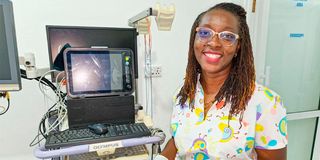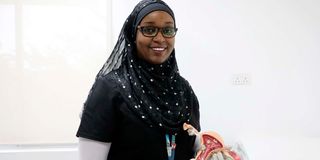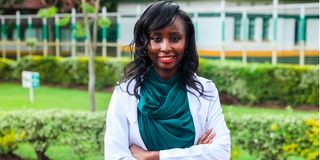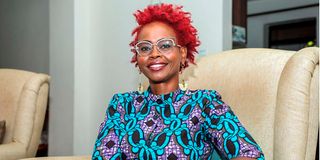Four pioneering doctors prove that gender diversity in operating theatres leads to better healthcare

From left: Yvonne Olwang', Anisa Mburu, Faith Mugoha Odwaro and Njeri Kamere. The four surgeons navigate motherhood, resource limitations, and gender bias while excelling in paediatric surgery, gynaecologic oncology, general surgery, and ophthalmology respectively.
What you need to know:
- Four Kenyan pioneers are transforming African healthcare with measurably better patient outcomes.
- The women navigate motherhood, resource limitations, and gender bias while excelling in general surgery, gynaecologic oncology, paediatric surgery, and ophthalmology respectively.
- Through their clinical excellence, community initiatives, and mentorship, these trailblazers are proving that women's participation in surgery isn't just about representation, but about saving more lives.
The scalpel trembles slightly in her hand—not from uncertainty, but from the weight of what it represents. In a continent where only nine per cent of surgeons are women, each incision Dr Faith Mugoha Odwaro makes isn't just healing a patient; it's cutting through centuries of gender barriers.
In operating rooms across Kenya, a quiet revolution is taking place. Women surgeons, once rare enough to be mistaken for nurses, are not only claiming their place at the table—they're redesigning it entirely.
Continental crisis
Africa faces a severe surgical care crisis that extends beyond gender. Over 90 per cent of people in Sub-Saharan Africa can’t access even basic surgical services. Data from the World Bank reveals the region has merely 0.5 surgeons per 100,000 people—starkly lower than the 38 per 100,000 in high-income countries.
At the first-ever Pan-African Surgical Conference held in Kigali, Rwanda in February, experts described the continent's surgical capacity as "alarmingly underdeveloped and underfunded," with glaring gaps in both infrastructure and human resources.
The gender imbalance compounds this crisis. Women remain significantly underrepresented in the surgical field, particularly in East, Central, and Southern Africa, where they account for only nine per cent of practicing surgeons.
A panel on gender equity at the Kigali conference revealed that deeply rooted cultural expectations, limited access to STEM education, and systemic barriers continue to discourage women from entering and advancing in surgical careers.
"Women surgeons often face exclusionary institutional norms, such as shared duty spaces with male colleagues, alongside broader issues like financial constraints, lack of mentorship, and safety concerns during training—especially in rural placements or night shifts," explained Dr Metasebia Worku Abebe, an associate professor of plastic and reconstructive surgery at St Paul Hospital, Millennium Medical College in Addis Ababa, Ethiopia.
This gender imbalance isn't just about representation—it affects patient outcomes. Research suggests female surgeons may bring distinct advantages to patient care, including better communication and adherence to clinical protocols, enhancing patient recovery.
A major review published by the National Library of Medicine in May 2024, which analysed over 5.4 million patients across 15 studies, found a seven per cent lower risk of postoperative mortality for patients treated by female surgeons. Another study published on May 15, 2024, by the British Journal of Surgery, which examined over 700,000 surgeries across 88 hospitals in Ontario, Canada, found that surgical teams with more than 35 per cent female surgeons and anaesthesiologists had a three per cent reduction in major postoperative complications within 90 days.
"This clearly shows the immense potential of women surgeons, and highlights how much the continent stands to lose by not fully harnessing this talent," said Dr Francoise Mukagaju, Rwanda's first female plastic surgeon.
Despite these challenges, change is emerging. Advocacy groups like Women in Surgery Africa (WiSA) are driving awareness and institutional support, while some universities are beginning to actively recruit and support female surgical trainees.
In Kenya, organisations like the Kenya Association of Women Surgeons and the Pan African Women Association of Surgeons have provided platforms for women in surgery, and the results—though still emerging—are becoming evident as women surgeons rise into leadership roles.
These trailblazing professionals aren't just excelling in their specialties and leading departments; they're mentoring future generations, transforming healthcare systems, and redefining the future of surgery in Africa.
Dr Faith Mugoha Odwaro: From grief to healing

Dr Faith Mugoha Odwaro explains the workings of an endoscopy machine at her facility in Majengo during an interview with on April 18, 2025.
Her path to medicine was born from pain. At just 15, she became a caregiver for her father, the late Rev Hosea Mazira Odwaro, battling leukaemia.
Hospital corridors in Kenya and Canada became her classrooms; her father's suffering, her syllabus. "My grief brought out strengths I never knew I had," she recalls, following his death in 1998. "It is my 'why'—the reason I push on even when things get tough."
Her journey into medicine began in 2004 when she was accepted to Kharkov State Medical University in Ukraine, later transferring to Odessa State Medical University (now Odessa National Medical University), where she graduated in 2009.
"I transferred from Kharkov in my fifth year of medical school. The cold there was intense, and after recovering from health issues, I was relieved to have the chance to move south. Changing universities, especially in the later years, isn't easy, but I quickly fell in love with my new home. And it loved me back. Odessa wasn't just warmer—it was vibrant, cosmopolitan, and full of wonderful people."
Though her passion had always been medicine, it was Dr Nicholas Tinega—a renowned surgeon and mentor—who opened her eyes to surgery during her internship at Mbagathi Hospital, in Nairobi, where she later worked as a medical officer in the surgical department.
"It felt like the dots were beginning to align. When I was accepted into the surgical residency program at Odessa National Medical University, I knew I was exactly where I was meant to be."
At Odessa, she thrived academically while balancing life as a new mother, thanks to Ukraine's supportive structure for pregnant trainees.
"Ukraine offers a special program for students whose personal circumstances prevent them from following the standard course schedule, and pregnancy is one such qualifying condition. The structure provides a flexible yet rigorous path, allowing students to complete the same curriculum and training hours without overwhelming pressure—enabling women to navigate motherhood and medical training simultaneously."
Being a woman in surgery came with its own battles. "In rural Kenya, people often assume the man is the doctor," she explains, recounting how patients would call her husband—who volunteers at the hospital—"daktari" while referring to her as "sister," a common term for nurses.
To change perceptions, she began playing videos in the hospital lounge showcasing her performing endoscopy and surgeries, allowing patients to witness her in action before entering the operating room.
Language was another hurdle. Though born in Vihiga, her Maragoli was rusty. "Language is a powerful tool, it breaks barriers. Even though most of my patients speak Kiswahili and English, speaking Maragoli is reassuring." Today, thanks to encouragement from local widows she works with, she can confidently conduct medical consultations in the language.
Her contributions extend beyond the scalpel. Even before graduating, she established the Mazira Foundation in 2006. After returning from graduation in 2009, the foundation launched several health initiatives in Vihiga County, including the Mazira Memorial Hospital in Chavugami, Majengo, which provides vital services—most notably life-saving endoscopy procedures.
Her work has earned her the Harvard PGSSC Global Surgery Frontline Award and an Emerging Leaders Foundation Health award. Through her foundation, she provides free healthcare to widows while advocating for policy changes to support marginalised groups.
Recognising the critical gap in endoscopy services, the hospital launched a regional endoscopy training program for physicians in February 2025, in partnership with the ROEYA Institute in Cairo, with inaugural training planned for May 2025.
"Our long-term vision is to establish ourselves as a centre of excellence in surgical gastroenterology."
According to Dr Odwaro, women in surgery have made progress, but "there's still a long way to go. Early pioneers paved the path, often at great personal cost."
From her experience in Ukraine, she highlights the importance of institutional support during motherhood—a critical period often overlooked in residency programs. "Pregnancy is not a disability," she states, "but it is a physically and emotionally taxing process that deserves support."
In Kenya, she says, the challenges are multifaceted: delayed diagnosis, resource limitations, poor infrastructure, and lack of trained personnel all hinder effective surgical care.
"Global surgery is about access, quality, and affordability," she says, "but in rural Kenya, these often feel like a mirage."
Still, she finds ways to stay resilient through faith, family, and passions like cooking and landscaping. She envisions a future where women are celebrated in surgery and dreams of a system supporting working mothers, where being a surgeon, wife, and mother aren't mutually exclusive.
"We need to bring our feminine care into the surgical space," she says. "To stand confidently in our intuition, and to never again be the only woman at the table."
Dr Anisa Mburu: An accidental calling

Dr Anisa Mburu, a gynaecology oncologist in Mombasa who champions cervical cancer prevention in this photo taken on April 24, 2025.
Unlike stereotypical stories of childhood dreams, Dr Anisa’s journey into medicine began with a twist of fate and a woman behind a desk at the Joint Admissions Board in Kenya.
Then a high school graduate with top marks and aspirations in theatre arts, she was rerouted into medicine by a stranger who believed the country needed more female doctors.
"I didn't originally choose medicine and was even squeamish about blood. I had planned to study Theatre Arts, but when I went to change my university choices at the Joint Admission Board, a lady who had my forms saw I had straight As, and told me there's need for more female doctors, she filled my forms and told me where to sign and told me to go away!"
Her brother later convinced her to accept the admission, leading her unexpectedly into medical school—a redirection that changed her life and countless others.
Though initially doubtful, her purpose crystallised during her internship. On her first night in 2010 at Moi Teaching and Referral Hospital in Eldoret, she was called to resuscitate a young mother with advanced cervical cancer but couldn't save her.
"When I went to certify her death I saw in her file that she was only 24 years old, a mother of three and had stage 4 cervical cancer. I couldn't understand how such a young person would die from such a disease."
This preventable loss drove her commitment to fighting cancer. That night, gynaecologic oncology found her—and she never looked back. Navigating the male-dominated surgical space came with familiar challenges: being underestimated, misjudged, and facing subtle resistance for daring to lead.
"When you show ambition, drive, and a strong sense of purpose, it's easy for others to mislabel you—as aggressive, or too masculine," she reflects.
What sustained her was clarity of purpose, unwavering focus, and supportive mentors and sponsors.
"Early in my career, I intentionally sought out connections at international conferences, turning targeted networking with experienced professionals into lasting partnerships and friendships."
Becoming a gynaecologic oncologist wasn't easy, especially as a wife and mother juggling residency alongside her husband, also in training.
"To pursue residency, I had to resign from my job as a medical officer, which meant giving up a stable income. Being a full-time student made it nearly impossible to find consistent work, and even when I did locums, payments were often delayed—or never came at all."
Financial insecurity and raising a young family could have derailed her ambitions. "My husband and I constantly worried about tuition, food, everything. The stress was immense," she says.
Time was another scarce resource between shifts, studies, and parenting. Yet Dr Mburu learned to embrace intentionality. "Be fully present wherever you are," a mentor once told her—words that became her mantra.
Today, she navigates her roles by letting go of perfection, prioritising presence over performance, and relying on open communication, especially with her 12-year-old son, to make limited time meaningful. She embraces delegation and self-compassion—like giving up cooking to focus on what she does best.
Her dedication to women's health extends beyond surgery; as founder of the SheFights Cancer Foundation, she leads efforts to empower women with gynaecological cancers through improved access to care, education, and advocacy.
"The foundation delivers critical services to underserved communities via mobile clinics and surgical outreach, while also using digital tools like WhatsApp to support rural healthcare workers."
Beyond her medical work, she collaborates with policymakers and contributes to national and international treatment guidelines. Dr Mburu contributed to the Kenyan Ministry of Health's Cervical Cancer Screening Guidelines launched in 2023 and collaborated with the European Society of Gynaecological Oncology to develop resource-stratified treatment protocols.
Her message to the next generation of women in medicine is clear: dream boldly, but walk with intention. "If you have a dream, chase it—for your dreams won't chase you back," she says, quoting lyrics that resonate deeply with her journey.
Dr Yvonne Olwang': Grace under pressure

Mbagathi County Referral Hospital paediatric surgeon Dr Yvonne Olwang’ poses for a photo in Nairobi on April 21, 2025.
A dynamic and faith-driven paediatric surgeon transforming children's access to surgical care in Kenya, Dr Yvonne Olwang' leads at Mbagathi County Referral Hospital in Nairobi County—the first paediatric surgeon at this Level 4 facility.
At just 36, she's one of few women in her field, having defied stereotypes, balanced motherhood and medical excellence, and now leading the charge toward equitable paediatric surgery in Kenya.
Her journey, which she describes as "full of grace, grit, and God," was shaped by her upbringing. With a general surgeon father and a paediatric ICU nurse mother, medicine was always close to home.
"I was brought up in the medical world," she says. "Most of my extended family is in the profession, so it wasn't hard to choose what I wanted." She always knew she loved "cutting" and loved kids, so becoming a paediatric surgeon felt like a natural alignment of passion and purpose.
But her path wasn't easy—it was one of perseverance, faith, and daily grace. "God did it," she reflects. "Amidst the challenges of single motherhood, each day of my training was filled with His grace." She even began surgical training while pregnant with her second child—a rollercoaster, she admits—but one she never let derail her ambitions.
Unlike many forced to take breaks or delay careers, Dr Olwang' pushed through, completing her program on time. "I had grace for each day," she says simply.
In a male-dominated field, she's faced biases. "It's always presumed the male surgeon is better," she notes. "From patient selection to team dynamics, they'll most definitely choose a male surgeon first." Rather than being discouraged, she meets challenges head-on with skill, confidence, and unwavering mission.
A turning point was her observation period at Children's National Hospital in Washington DC. "It was mind-blowing to see the efficiency of a working system," she recalls. From advanced surgical tools to cohesive multidisciplinary teams, it showed her what was possible and deepened her resolve to bring the same excellence to Kenya.
Her current work highlights persistent systemic issues within Kenya's public health system, particularly in paediatric care.
"Our county hospitals simply aren't equipped for paediatric surgical services," she says. "We urgently need dedicated paediatric operating theatres, neonatal ICUs, and paediatric ICUs at the county level. At Mbagathi Hospital, we do have a neonatal ICU, but it needs to be expanded to serve all our new-borns, and we must establish paediatric ICUs in county hospitals as well."
Until those needs are met, complex cases continue being referred to Kenyatta National Hospital.
Despite these obstacles, she's spearheading efforts to establish a dedicated Paediatric Surgical Centre in Nairobi County, focusing on colorectal and pelvic reconstruction—areas where children often suffer silently due to specialist shortages.
For Dr Olwang', balance isn't about perfection but presence. "As Shonda Rhimes once said, when you see me succeeding in one area, I'm probably failing in another," she says candidly. But she's at peace with her choices. "When I'm at home, I give my children 100 per cent. When I'm at work, I give that 100 per cent too."
Personal time requires intentionality. "I am not the best at it," she admits, "but I'm at peace."
Her greatest moments come from witnessing transformation in young patients. "There was this child I took from emergency surgery to ICU, and weeks later we discharged them home, full of life," she says. "That feeling is inexplicable. I live for such days."
Looking ahead, she envisions a future where no child is denied surgical care because of birthplace. Her goal is to specialise fully in paediatric colorectal surgery and become a leading voice for equitable surgical care in Africa.
"I hope to advance specialised training, engage in meaningful research, build strong partnerships, and help influence policies," she shares.
While not yet fully involved in global surgery initiatives, she's determined to carve her space. "I believe African voices must be part of the global solution."
Her advice to young women considering surgery? "Know that this journey is not for the faint-hearted," she says. "But it's worth every step. Believe in your dreams, hold on to your 'why,' and trust God to walk with you. Only you can define your limits."
Dr Njeri Kamere: Visionary care

Dr Njeri Kamere, an ophthalmic surgeon poses for a photo in Nairobi on April 21, 2025.
Her path into ophthalmology began with curiosity rather than a profound revelation.
After eight years in public health, she was ready to specialise. When deciding between anaesthesia and ophthalmology, she humorously recalls wondering, "Haka kajicho—how many problems can it possibly have?"
That spark led her into the intricate world of eye surgery, where the smallest movements could change a patient's vision—and life.
Her fascination deepened during an elective rotation at Lions SightFirst Eye Hospital in Nairobi in 2019, under Dr Wanjiku Muthee, a renowned paediatric ophthalmologist and advocate for women's leadership in eye care.
Her defining moment came when her last patient at Lions SightFirst achieved near-perfect vision after surgery. "I was thrilled," she recalls. "It gave me the boost I needed to complete my residency program."
That year, she graduated as part of the first-ever all-female ophthalmology class at the University of Nairobi—a historic milestone since the program's 1978 establishment.
Eight women graduated—seven Kenyans and two foreign nationals—redefining representation and leadership for women in surgery. Their journey, shaped by late-night study sessions and surgical camaraderie, evolved into a powerful collective.
"We remain connected through WhatsApp, the Ophthalmological Society of Kenya's annual conferences, and the regional College of Ophthalmology of Eastern, Central, and Southern Africa (COECSA), which also hosts yearly gatherings that bring us together."
Rural clinics
Despite this support, she couldn't escape the emotional and technical demands of ophthalmic surgery—stopping mid-surgery to talk through a patient's tears or dealing with unexpected complications that keep her awake at night.
She values her spare time, dedicating it to mental health and personal well-being. "Sports and mental health are incredibly important to me—especially with the rising suicide rates among doctors," she says.
She's part of a book club and contributes to SheLeads, where she recently authored a chapter.
To balance her ophthalmology demands, she engages in outreach programs restoring sight to underserved communities in counties like Meru and Garissa. "During our outreach camps, we offer eye care consultations, provide necessary medications, and perform surgeries," she explains. "Most of the procedures we carry out are cataract surgeries."
Dr Kamere has made significant national impact. Drawing on global academic experience from the London School of Hygiene and Tropical Medicine to Harvard Medical School, she's collaborated with the Ministry of Health on national eye care policies and helped develop key resources like the Childhood Blindness Prevention Manual.
Involved in digital health for over five years, in 2024 she expanded into Artificial Intelligence applications in healthcare as Principal Investigator for a project developing an AI-enhanced clinical decision support tool for clinicians managing advanced HIV disease in South Africa.
The WhatsApp-based chatbot, trained on South Africa's National Treatment Guidelines, achieved over 80 per cent accuracy in clinical evaluation—proving tech-enabled care's potential in low-resource settings.
She envisions similar tools for Kenyan eye care: "Imagine AI-supported diagnostics in rural clinics, accessible from a simple smartphone. That's the future—and we're building it."
Navigating medicine as a woman surgeon in Kenya has challenges. "Gender stereotypes still persist, and representation at senior leadership levels remains low."
Dr Kamere sees this not as a roadblock but a call to action. "There's space for all of us in surgery," she asserts. "You just have to show up, be excellent, and make room for others."
She advocates for policy reforms promoting gender equity, structured mentorship, and intentional leadership development for women—especially in technical fields.
Looking ahead, she's focused on transforming eye care accessibility in Kenya through primary health system integration, AI, simulation training, and digital health tools. Her vision: high-quality, equitable, tech-augmented eye care reaching even remote communities.
She believes Kenya's health system must elevate eye care as a central component of universal health coverage. "We need to treat eye care not as a luxury, but as a basic right."
To young women dreaming of medicine or surgery, her advice is profound: "Be kind. Be compassionate. Don't be afraid to ask for help. And treat every patient like they're your family."
Future in skilled hands
As these four remarkable women surgeons demonstrate, the future of African surgery isn't just about increasing numbers—it's about transforming systems, redefining excellence, and creating pathways for those who follow.
Their stories reveal a common thread: resilience in the face of systemic challenges, innovation despite resource constraints, and a deep commitment to both technical excellence and compassionate care.
The surgical revolution happening in operating rooms is quiet but profound. With each procedure, each mentorship relationship, and each policy change, these women aren't just saving patients—they're healing a healthcare system that has too long operated without the full participation of women's talents and perspectives. In their skilled hands, Africa's surgical future looks not just brighter, but fundamentally transformed.


